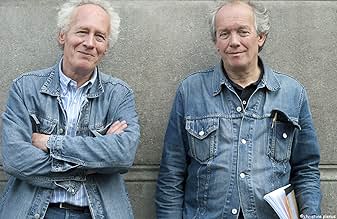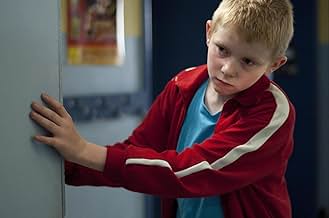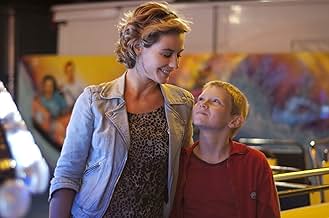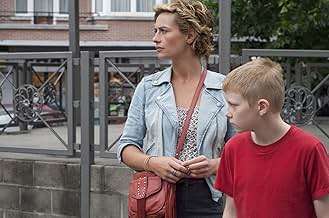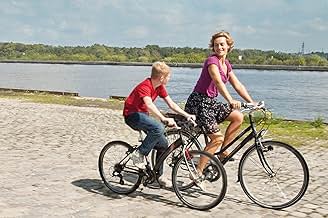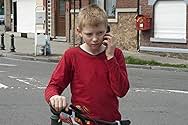PUNTUACIÓN EN IMDb
7,4/10
29 mil
TU PUNTUACIÓN
Un padre abandona a su hijo en una institución para jóvenes en una zona rural de Francia. En un acto de bondad, la peluquera local lo acoge los fines de semana.Un padre abandona a su hijo en una institución para jóvenes en una zona rural de Francia. En un acto de bondad, la peluquera local lo acoge los fines de semana.Un padre abandona a su hijo en una institución para jóvenes en una zona rural de Francia. En un acto de bondad, la peluquera local lo acoge los fines de semana.
- Dirección
- Guión
- Reparto principal
- Premios
- 9 premios y 31 nominaciones en total
Cécile de France
- Samantha
- (as Cécile De France)
Samuel De Ryck
- Éducateur 2
- (as Samuel De Rijk)
Reseñas destacadas
"Not everyone can be an orphan." Andre Gide
A kid with only a bike and no mother or active father---now that's a setup for sentiment. Yet the Dardenne brothers have fashioned an unsentimental, realistic drama, The Kid with a Bike, about an 11 year old boy, Cyril (Thomas Doret), who is fortunately taken in by a guardian, town hairdresser Samantha (Cecile De France), but not without serious setbacks that are understandable given his unstable background.
The title evokes thoughts of the famous Italian neo-realist Bicycle Thief, in which a young boy is introduced to life's hard knocks through an imperfect father. In Kid, the father is a deadbeat deserter whose brief appearances are depressing because it's clear a reconnection with his son is not going to happen.
Cyril is running through most of the film, either by bike or foot, a motif signifying his desperate desire for a parent. However blood does not have to be in the loving equation as Samantha becomes a willing surrogate.
No surprise The Boy with the Bike won the Grand Jury Prize at Cannes (2011) and the directors several times before in multiple categories. The humanity rather than the technicality dominates the emotionality; the two principal actors, Doret and De France, are incomparably natural and convincing. Make no mistake, this is a film about a boy, whose character arc the directors fully present. Whether or not he ends up for good through all the turmoil is the pleasure of watching this soon-to-be classic.
You may think again about leaving your child with only his bicycle.
A kid with only a bike and no mother or active father---now that's a setup for sentiment. Yet the Dardenne brothers have fashioned an unsentimental, realistic drama, The Kid with a Bike, about an 11 year old boy, Cyril (Thomas Doret), who is fortunately taken in by a guardian, town hairdresser Samantha (Cecile De France), but not without serious setbacks that are understandable given his unstable background.
The title evokes thoughts of the famous Italian neo-realist Bicycle Thief, in which a young boy is introduced to life's hard knocks through an imperfect father. In Kid, the father is a deadbeat deserter whose brief appearances are depressing because it's clear a reconnection with his son is not going to happen.
Cyril is running through most of the film, either by bike or foot, a motif signifying his desperate desire for a parent. However blood does not have to be in the loving equation as Samantha becomes a willing surrogate.
No surprise The Boy with the Bike won the Grand Jury Prize at Cannes (2011) and the directors several times before in multiple categories. The humanity rather than the technicality dominates the emotionality; the two principal actors, Doret and De France, are incomparably natural and convincing. Make no mistake, this is a film about a boy, whose character arc the directors fully present. Whether or not he ends up for good through all the turmoil is the pleasure of watching this soon-to-be classic.
You may think again about leaving your child with only his bicycle.
The Dardenne brothers (L'Enfant, Lorna's Silence) once again demonstrate their mastery for crafting character studies around broken souls trying to get by in France, with their newest film, The Kid With A Bike. The film opens with young Cyril Catoul (Thomas Doret), trying to break free from an orphanage to see his father, while everyone around him is trying to explain that his father has left him there. It's a heartbreaking opening, immediately giving us a taste of the magnificent performance that Doret will continue to demonstrate over the course of the film. Cyril is desperate to escape their clutches and refuses to listen to their pleas for understanding. He's a rebellious young boy, unyielding in his cause and so sure that there must be some explanation; surely his father couldn't be that cruel. Of course the audience knows the revelation he is most likely going to receive.
Soon he comes into the care of Samantha (the always great Cecile De France), a hairdresser in the town nearby who runs into him by chance, and this is where the film really starts to succeed. The relationship at the core of the film isn't with Cyril and his father (whom we do eventually meet), but instead with him and Samantha. Cyril spends his time pouting, rebelling and generally being your standard adolescent boy, while Samantha tries to become this mother never had. Cecile De France is an actress I'm always interested to watch, with her expressive face that she's put to great use in many films before this but never so well as she does here. Samantha's resilience towards Cyril's constant attempts to pull away make it clear that she must have come from a situation similar to his, and is fighting so fiercely to make sure he doesn't face the fate that she knows exists. In a town filled with troubled youths, Samantha fought her way out the other side and she wants to bring Cyril there with her. It's a very warming dynamic and the Dardennes really make you feel all of the highs and lows of it. This isn't your standard character study; you feel these characters like very few films can make you do.
One of the most sensational aspects of the picture is the performance anchoring it all from Thomas Doret. Watching Doret, I couldn't help but be reminded of the young Jean-Pierre Leaud in The 400 Blows. Cyril is a rebel in the purest form, broke down by the society he's been born into and constantly fighting back against the authority figures in his life. But unlike Leaud's Antoine Doinel, Cyril isn't looking for freedom here; he's looking for acceptance. Throughout the film Cyril is pulled in a multitude of directions, but the only one he wants to get pulled into is the arms of his father; and in the twisted harshness of life, that's the one direction that just pushes him away. Doret completely embodies this character, absent of any tick or fallacy that generally comes with a child actor. It's got to be the finest child performance put on screen in quite some time. The boy isn't some adorable little kid; he's a real person and sometimes he drives you insane, but you always end up rooting for him when it comes down to it. My heart sank in the moments with his father (played well by Dardennes regular Jeremie Renier), warmed in the few bright spots in his life and when he was in danger I almost drew blood from digging my nails into my palm due to the tension.
Along with the emotional journey that the Cyril/Samantha dynamic takes you on, the Dardennes also imbue the film with a dark fairy tale metaphor that I found added a great new layer to Cyril's story. Cyril spends the film wearing a variety of red tops, clearly representing our Riding Hood lost in the woods, and at a certain point he encounters our version of the Big Bad Wolf; a troubled youth who didn't have the luxury of a Samantha in his life. This Wolf is the counter to Samantha's mother figure and Cyril is a broken soul caught in a world where he could walk down the dark path of the drug dealers and thieves or into the light that Samantha tries to open up to him. It's a strikingly human story that keeps you on your toes and grasps your heart. I won't reveal the final path that Cyril ends up taking, but it kept me in tears for the final ten or fifteen minutes.
Soon he comes into the care of Samantha (the always great Cecile De France), a hairdresser in the town nearby who runs into him by chance, and this is where the film really starts to succeed. The relationship at the core of the film isn't with Cyril and his father (whom we do eventually meet), but instead with him and Samantha. Cyril spends his time pouting, rebelling and generally being your standard adolescent boy, while Samantha tries to become this mother never had. Cecile De France is an actress I'm always interested to watch, with her expressive face that she's put to great use in many films before this but never so well as she does here. Samantha's resilience towards Cyril's constant attempts to pull away make it clear that she must have come from a situation similar to his, and is fighting so fiercely to make sure he doesn't face the fate that she knows exists. In a town filled with troubled youths, Samantha fought her way out the other side and she wants to bring Cyril there with her. It's a very warming dynamic and the Dardennes really make you feel all of the highs and lows of it. This isn't your standard character study; you feel these characters like very few films can make you do.
One of the most sensational aspects of the picture is the performance anchoring it all from Thomas Doret. Watching Doret, I couldn't help but be reminded of the young Jean-Pierre Leaud in The 400 Blows. Cyril is a rebel in the purest form, broke down by the society he's been born into and constantly fighting back against the authority figures in his life. But unlike Leaud's Antoine Doinel, Cyril isn't looking for freedom here; he's looking for acceptance. Throughout the film Cyril is pulled in a multitude of directions, but the only one he wants to get pulled into is the arms of his father; and in the twisted harshness of life, that's the one direction that just pushes him away. Doret completely embodies this character, absent of any tick or fallacy that generally comes with a child actor. It's got to be the finest child performance put on screen in quite some time. The boy isn't some adorable little kid; he's a real person and sometimes he drives you insane, but you always end up rooting for him when it comes down to it. My heart sank in the moments with his father (played well by Dardennes regular Jeremie Renier), warmed in the few bright spots in his life and when he was in danger I almost drew blood from digging my nails into my palm due to the tension.
Along with the emotional journey that the Cyril/Samantha dynamic takes you on, the Dardennes also imbue the film with a dark fairy tale metaphor that I found added a great new layer to Cyril's story. Cyril spends the film wearing a variety of red tops, clearly representing our Riding Hood lost in the woods, and at a certain point he encounters our version of the Big Bad Wolf; a troubled youth who didn't have the luxury of a Samantha in his life. This Wolf is the counter to Samantha's mother figure and Cyril is a broken soul caught in a world where he could walk down the dark path of the drug dealers and thieves or into the light that Samantha tries to open up to him. It's a strikingly human story that keeps you on your toes and grasps your heart. I won't reveal the final path that Cyril ends up taking, but it kept me in tears for the final ten or fifteen minutes.
Greetings again from the darkness. When Guy (Jeremie Renier) states that he can't take care of his son Cyril (Thomas Douret) right now, I felt a rush of anger and disgust. Imagine if you were his 11 year old son hearing those words. Young kids should be able to count on their parents for emotional security above all else. There should be no fear of abandonment ... those are issues no child should be forced to deal with (barring a natural disaster).
The Belgium writer/director team of brothers Jean-Pierre and Luc Dardenne have a history of taking on parenthood and childhood in a head-on manner. Cyril is dumped in an orphanage by his dad, and is convinced that he is just misplaced, not abandoned. So being the fiercely determined kid he is, he re-traces his steps from coffee shops to bars to their old apartment. Cyril is convinced his dad never would have sold his treasured bicycle, no matter how desperate for money he was.
Whatever confusion and hostility that you think Cyril might experience, once he confronts his dad, the filmmakers display it in the rawest possible form. Cyril is a symbol of need, hiding behind a wall of rebellion. A chance encounter with Samantha (Cecile de France) leads to weekend visitations and the start of an awkward quasi-family life for both of them. Cyril tests Samantha and all other authority figures in every possible manner, often to the breaking point.
As a parent, it's easy to spot the vulnerabilities that a child faces before they have the maturity to handle it. We see how easily Cyril falls in with the wrong crowd and how quickly things can get really bad. Luckily for Cyril, Samantha doesn't abandon him. She answers "I don't know" to his question of why she let him stay with her. Although, the filmmakers never let us in on her deepest thoughts, we suspect she was once not all so different than Cyril, and someone stepped up for her.
This film won the Grand Jury Prize at Cannes in 2011 and it's easy to see how. It shows how difficult and messy ordinary life can be, but how often things turn out OK, though rarely perfect. Film lovers will recognize Cecile de France from her many films, including the recent Hereafter and the excellent Mesrine.
The Belgium writer/director team of brothers Jean-Pierre and Luc Dardenne have a history of taking on parenthood and childhood in a head-on manner. Cyril is dumped in an orphanage by his dad, and is convinced that he is just misplaced, not abandoned. So being the fiercely determined kid he is, he re-traces his steps from coffee shops to bars to their old apartment. Cyril is convinced his dad never would have sold his treasured bicycle, no matter how desperate for money he was.
Whatever confusion and hostility that you think Cyril might experience, once he confronts his dad, the filmmakers display it in the rawest possible form. Cyril is a symbol of need, hiding behind a wall of rebellion. A chance encounter with Samantha (Cecile de France) leads to weekend visitations and the start of an awkward quasi-family life for both of them. Cyril tests Samantha and all other authority figures in every possible manner, often to the breaking point.
As a parent, it's easy to spot the vulnerabilities that a child faces before they have the maturity to handle it. We see how easily Cyril falls in with the wrong crowd and how quickly things can get really bad. Luckily for Cyril, Samantha doesn't abandon him. She answers "I don't know" to his question of why she let him stay with her. Although, the filmmakers never let us in on her deepest thoughts, we suspect she was once not all so different than Cyril, and someone stepped up for her.
This film won the Grand Jury Prize at Cannes in 2011 and it's easy to see how. It shows how difficult and messy ordinary life can be, but how often things turn out OK, though rarely perfect. Film lovers will recognize Cecile de France from her many films, including the recent Hereafter and the excellent Mesrine.
I recently saw this at the 2012 Palm Springs International Film Festival. This was Belgium's official submission to the Academy Awards for Best Foreign Language Film and won the Grand Prix as the Jury Prize winner at the Cannes film Festival. Cyril Catoul (Thomas Doret) is living in a state run home and school for children after his single parent father Guy Catoul (Jérémie Renier) abandoned him. Cyril's father promised him that he wouldn't sell his beloved bike and when the father never returns to take him from the state care he sets out in search of his father and his bike. A kind single woman, Samantha, (Cécile De France) takes pity on him and tracks down the bicycle that his father had sold and buys it and returns it to Cyril. Samantha soon takes Cyril in to live with her part-time. Cyril is a very troubled young boy and is longing to belong and have a family. He has a temper and is a candidate for a troubled life. From writers/directors/producers the Dardenne brothers, this is a good story with fine acting. I'm sure for the role of Cyril, the directors instructed first time actor Doret, to act like a brat and be who he isn't. It worked well. De France is great as the strong and sympathetic Samantha. The story moves along well with a good score and nice editing. It's a little implausible at times and kind of far-fetched but it's a crowd pleaser and I would give it an 8.0 and recommend it.
This film takes place in Europe (Belgium, apparently) so it has far less of the violence that would accompany the same story set in America. But otherwise the story is particularly painful to watch because the essential elements - a kid without a father, his self-hate and anger, the substitute father figures laying in wait - are directly relevant to the American context. In a lean, tough story, the film takes us through a broad tour of the issues and risks and even reasons for hope in these situations. Young Thomas Doret fiercely embodies the aching and the rage of a boy who wants a father at any price and is a near-force of nature in trying to obtain what should be his by right. Cécile De France's Samantha has numerous real-life counter-parts, credited by more than one survivor of these dilemmas, but not always successful in their roles as passionate rescuers. How this particular story turns out is not so important as the realization that all across the world children live in Cyril's situation; some make it, many don't.
¿Sabías que...?
- CuriosidadesFor both the moments where Cyril is running from the police and ends up in the doctor's office and the opening scene when he's using the phone and won't let go, the young actor was just instructed by the directors not to give up what the character was doing under any circumstance.
- PifiasWhen the hairdresser is leaving the orphanage after she returned Cyrill's bike the car she is driving makes the sound of Diesel engine, but in the next scene with the same car the car sounds like it has a petrol engine.
- Citas
Guy Catoul: It's too much. I can't look after him.
- ConexionesFeatured in At the Movies: Cannes Film Festival 2011 (2011)
- Banda sonoraAdagio un poco mosso
from Piano Concerto No. 5, Op. 73
written by Ludwig van Beethoven
performed by Alfred Brendel and the London Philharmonic Orchestra
conducted by Bernard Haitink
Selecciones populares
Inicia sesión para calificar y añadir a tu lista para recibir recomendaciones personalizadas
- How long is The Kid with a Bike?Con tecnología de Alexa
Detalles
- Fecha de lanzamiento
- Países de origen
- Sitios oficiales
- Idioma
- Títulos en diferentes países
- El nen de la bicicleta
- Localizaciones del rodaje
- Empresas productoras
- Ver más compañías en los créditos en IMDbPro
Taquilla
- Recaudación en Estados Unidos y Canadá
- 1.470.000 US$
- Fin de semana de estreno en EE. UU. y Canadá
- 45.933 US$
- 18 mar 2012
- Recaudación en todo el mundo
- 7.182.147 US$
- Duración1 hora 27 minutos
- Color
- Mezcla de sonido
- Relación de aspecto
- 1.85 : 1
Contribuir a esta página
Sugerir un cambio o añadir el contenido que falta

Principal laguna de datos
What is the Japanese language plot outline for El niño de la bicicleta (2011)?
Responde

